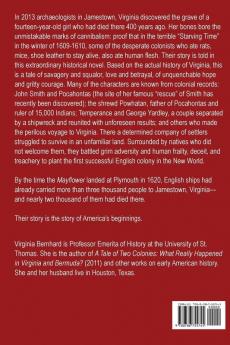English
Paperback
₹2346
₹2396
2.09% OFF
(All inclusive*)
Delivery Options
Please enter pincode to check delivery time.
*COD & Shipping Charges may apply on certain items.
Review final details at checkout.
Looking to place a bulk order? SUBMIT DETAILS
About The Book
Description
Author
In 2013 archaeologists in Jamestown, Virginia discovered the grave of a fourteen-year-old girl who had died there 400 years ago. Her bones bore the unmistakable marks of cannibalism: proof that in the terrible "Starving Time" in the winter of 1609-1610, some of the desperate colonists who ate rats, mice, shoe leather to stay alive, also ate human flesh. Their story is told in this extraordinary historical novel. Based on the actual history of Virginia, this is a tale of savagery and squalor, love and betrayal, of unquenchable hope and gritty courage. Many of the characters are known from colonial records: John Smith and Pocahontas (the site of her famous "rescue" of Smith has recently been discovered); the shrewd Powhatan, father of Pocahontas and ruler of 15,000 Indians; Temperance and George Yardley, a couple separated by a shipwreck and reunited with unforeseen results; and others who made the perilous voyage to Virginia. There a determined company of settlers struggled to survive in an unfamiliar land. Surrounded by natives who did not welcome them, they battled grim adversity and human frailty, deceit, and treachery to plant the first successful English colony in the New World.
By the time the Mayflower landed at Plymouth in 1620, English ships had already carried more than three thousand people to Jamestown, Virginia--and nearly two thousand of them had died there.
Their story is the story of America's beginnings.Virginia Bernhard is Professor Emerita of History at the University of
St. Thomas. She is the author of A TALE OF TWO COLONIES: WHAT REALLY HAPPENED IN VIRGINIA AND BERMUDA? (2011) and other works on early American history. She and her husband live in Houston, Texas.
"A complex tale of courage, treachery, cultural conflict, administrative bungling and desperate choices."
PUBLISHERS WEEKLY
"Colonial Jamestown springs from the pages. An absorbing telling that blends fact and fiction."
NEW YORK DAILY NEWS
"Combines Bernhard's expertise as an American history professor with a vivid, sure prose style to produce a rich tale of suffering and triumph in 1600s America."
KIRKUS REVIEWS"
Delivery Options
Please enter pincode to check delivery time.
*COD & Shipping Charges may apply on certain items.
Review final details at checkout.
Details
ISBN 13
9780786755745
Publication Date
-01-02-2014
Pages
-446
Weight
-600 grams
Dimensions
-152x229x25.21 mm











